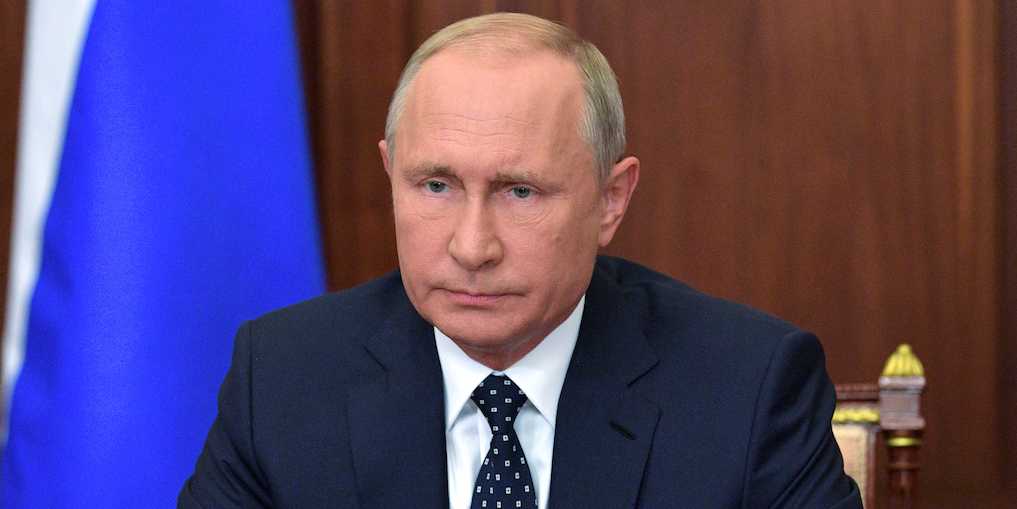- Russian President Vladimir Putin announced on Wednesday a decision to raise Russia’s retirement age.
- In 2005, Putin made a high-profile promise on national TV that the pension age would never increase while he is president.
- Unions have warned that raising the retirement age would mean that many people in Russia will miss out on a pension altogether, as life expectancies in Russia are lower than in Western countries.
- Putin has been under pressure to make the change because of Russia’s aging population and economic deficit.
- The reforms have attracted huge protests and forced Putin’s popularity rating to a four-year low.
Russian President Vladimir Putin is breaking a promise he made 13 years ago by hiking Russia’s pension age – and it could weaken his grip on power at the top of Russian politics.
In a rare TV announcement on Wednesday, Putin said he would raise the retirement age for women to 60 from 55 and for men to 65 from 60 starting in 2019.
The decision is a massive reversal of a promise Putin famously made on live TV in 2005.
In phone-in session during his first term, Putin said the retirement age would never go up while he is in charge. You can hear him discuss that (in Russian) here:
Here's the full quote, translated from a transcript published by Russian state TV:
"I am against increasing the terms of retirement age. And while I am president, there will be no such decision. In general, I believe that we do not need to raise the retirement age.
"It is necessary to encourage people who believe that after reaching the labor age of retirement, they can continue working for health reasons. It is possible to stimulate and create economic conditions for the continuation of labor activity, but not infringe on their pension rights."
Putin has since been forced to retreat from his promise in order to face the country's economic reality.
His proposal is already a slightly watered-down version of the original plan by the Russian government, which wanted to raise the retirement age for women to 63. It stayed at 60 under Putin's proposal because women "also take care of the house and children and grandchildren," Putin said, according to the BBC.
On Wednesday, Putin said the decision to raise the national retirement age had been delayed for years and could no longer be postponed because Russia's labor market is shrinking, the BBC reported.
He also warned that not moving on the decision would risk causing inflation and increasing poverty, threatening the stability and security of the nation.
Russia already faces a weak economy, crippled by falling oil prices and ongoing international sanctions. It is anticipating a deficit of more than 265 billion rubles ($4 billion/£3 billion) in 2018 alone, the BBC said.
"Any further delay would be irresponsible," Putin said, according to Steve Rosenberg, the BBC's Moscow correspondent.
When challenged on the reversal by reporters in June, Putin's spokesman, Dmitry Peskov, said that the 2005 promise was made a long time ago and that "the situation has changed since then," Radio Free Europe/Radio Liberty reported.

Pension reform is a sore point in Russia
The life expectancy for Russian men is 66, while for women it is 77, according to World Health Organization statistics; for the US it is 76 and 81. Unions have warned that many Russians would not live long enough to claim a pension under the increased retirement age, the BBC said.
After the government announced the pension-reform proposal on June 14 - the opening day of the World Cup in Moscow - opposition groups across the political spectrum in Russia protested en masse.
Putin's popularity rating also plummeted to a four-year low, to about 67% from 80%, over the issue, Reuters reported on Wednesday.

Groups including labor unions, the Communist Party, and supporters of Alexei Navalny, a prominent Putin critic, organized protests.
More than 2 million people signed a petition against pension reforms, Al Jazeera reported. And The Guardian said in early July that demonstrations had attracted crowds of up to 3,000. Protests also took place in traditionally pro-Putin strongholds in the country, according to The Wall Street Journal.
Until Wednesday's announcement, Putin had been trying to distance himself from the pension debate - indicating the unpopularity of the policy and its threat to his grip on power.
Peskov said in June: "The matter is being worked out by the government. The president is not taking part in that process."
The BBC's Rosenberg tweeted on Wednesday: "Until today, Putin had distanced himself from the unpopular pension reform ... But with this TV address, Putin becomes the face of the reform."

